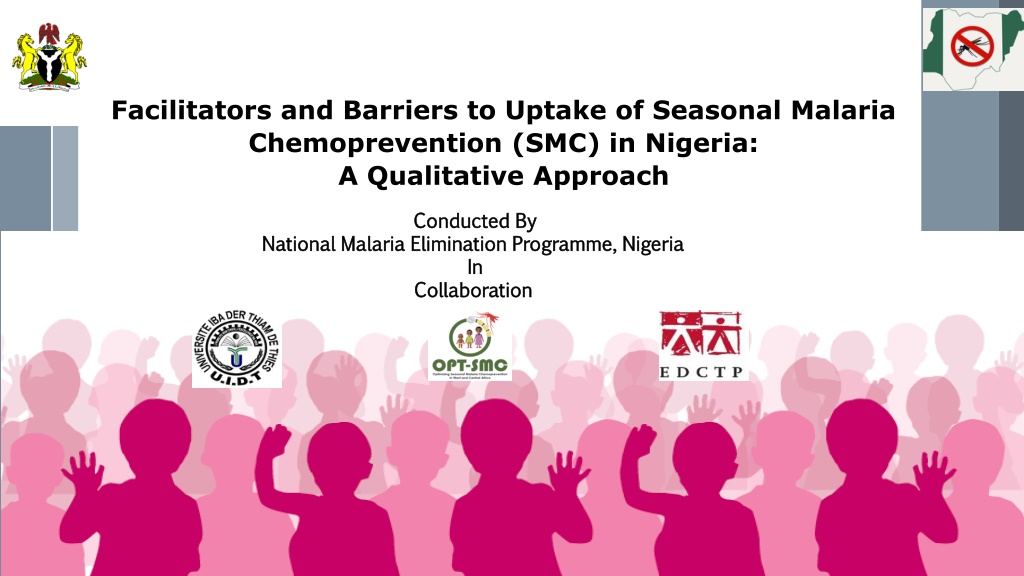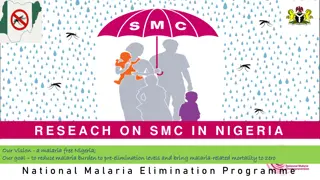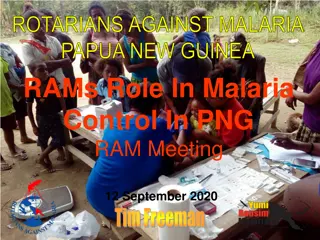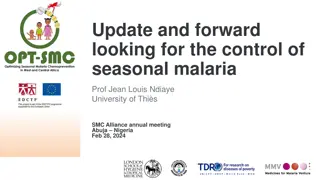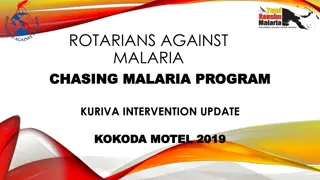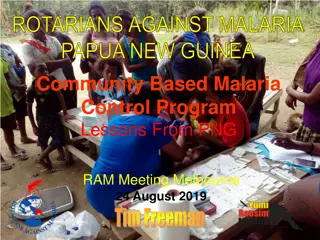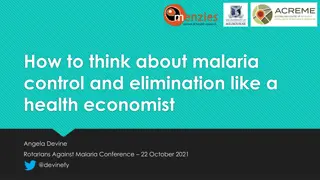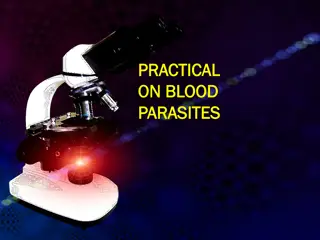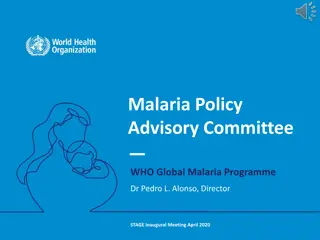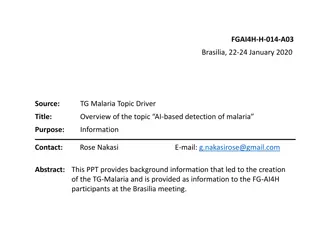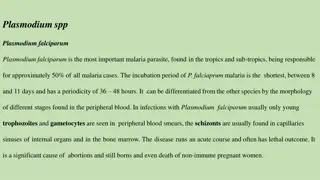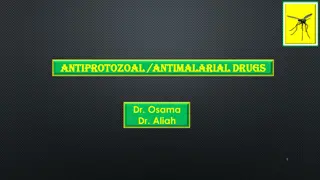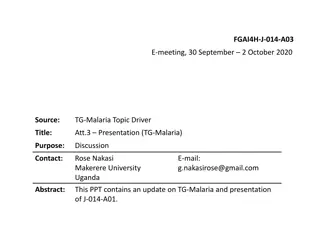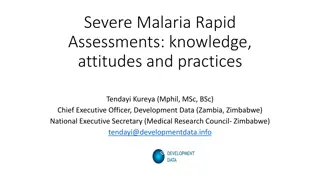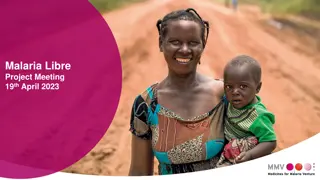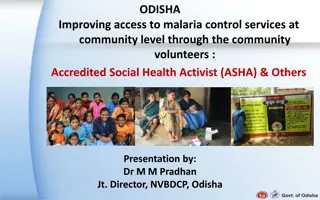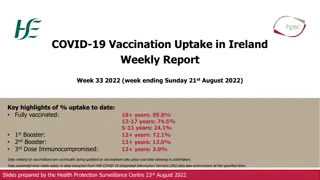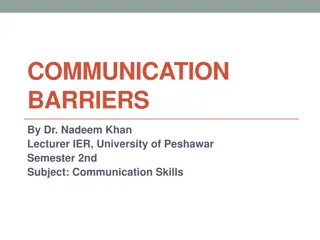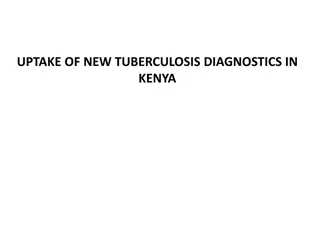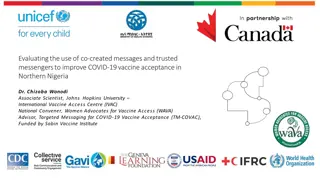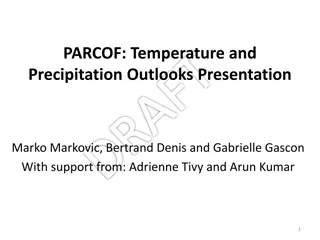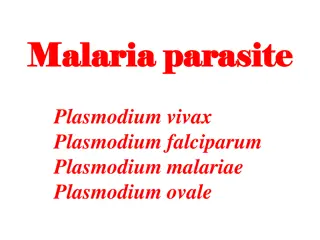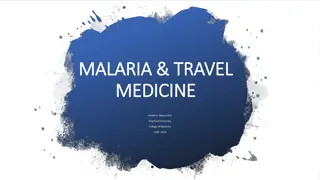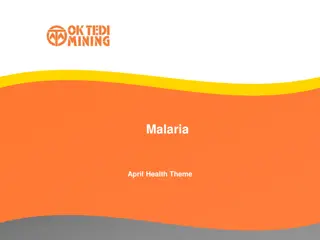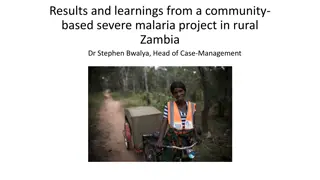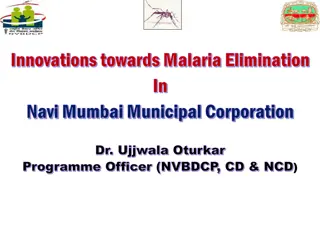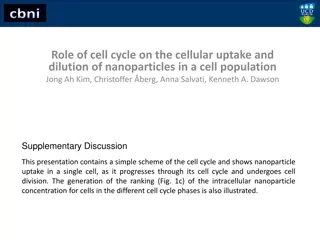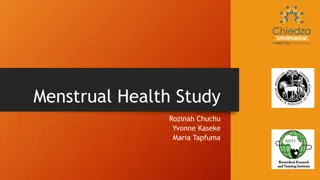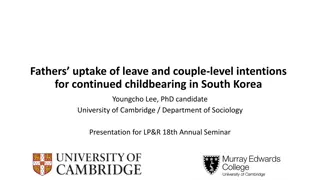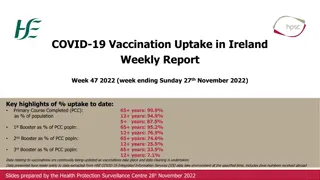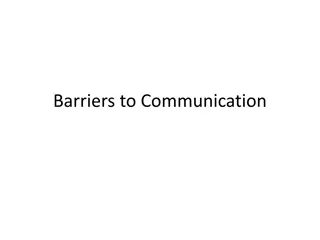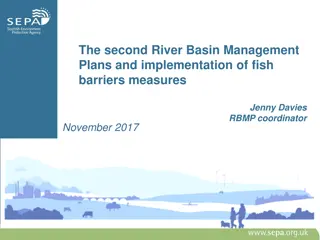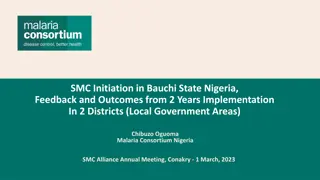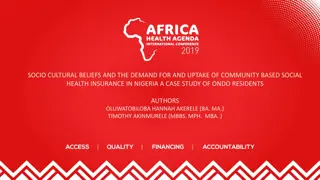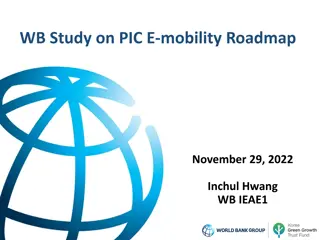Understanding Facilitators and Barriers to Seasonal Malaria Chemoprevention Uptake in Nigeria
This qualitative study conducted by the National Malaria Elimination Programme in Nigeria aimed to identify factors influencing the uptake of Seasonal Malaria Chemoprevention (SMC) among children aged 3-59 months in selected states. The study explored caregivers' knowledge, experiences, and attitudes towards SMC, as well as health workers' perspectives on the delivery of SMC. Methodology included focus group discussions and in-depth interviews in five states. The ultimate vision is to achieve a malaria-free Nigeria by reducing the burden of the disease.
Uploaded on Sep 23, 2024 | 0 Views
Download Presentation

Please find below an Image/Link to download the presentation.
The content on the website is provided AS IS for your information and personal use only. It may not be sold, licensed, or shared on other websites without obtaining consent from the author. Download presentation by click this link. If you encounter any issues during the download, it is possible that the publisher has removed the file from their server.
E N D
Presentation Transcript
Facilitators and Barriers to Uptake of Seasonal Malaria Chemoprevention (SMC) in Nigeria: A Qualitative Approach Conducted By Conducted By National Malaria Elimination Programme, Nigeria National Malaria Elimination Programme, Nigeria In In Collaboration Collaboration
Study Objectives Study Objectives Aim is to determine facilitators and barriers to uptake of SMC among children aged 3- 59months in selected States in Nigeria Specifically, i. knowledge of malaria whether it affects uptake of SMC, and to examine ii. perceived effect of SMC on their children's health, iii. experiences and attitudes of caregivers concerning the concept of SMC, iv. experiences and attitudes of caregivers concerning the regimen of the chemoprevention v. preferred mode of delivery/place of administration of SMC by caregivers vi. health workers attitudes and experiences regarding delivery of SMC vii.to determine if (ii)-(vi) above affects uptake of SMC Our Vision Our Vision - - a malaria free Nigeria; Our goal a malaria free Nigeria; Our goal to reduce malaria burden to pre mortality to zero mortality to zero to reduce malaria burden to pre- -elimination levels and bring malaria elimination levels and bring malaria- -related related
Methodology Methodology Purposively selected 5 States: Kano, Kebbi, Kwara, Nasarawa & Yobe Two LGAs in each State Two Wards/Communities in each LGA Based on performance in SMC in last round Study Population: Caregivers-mothers, fathers, guardians Community-Directed Distributors (CDDs), LM, CM Community Leaders LGA Malaria Focal Person Director of Public Health/Disease Control and Malaria Programme Manager National Programme Officers/Partners: National Coordinator NMEP, Malaria Consortium, WHO, PMI, GF Our Vision Our Vision - - a malaria free Nigeria; Our goal a malaria free Nigeria; Our goal to reduce malaria burden to pre mortality to zero mortality to zero to reduce malaria burden to pre- -elimination levels and bring malaria elimination levels and bring malaria- -related related
Methodology Methodology Data Collection: State State FGDs FGDs In In- -depth interviews depth interviews Total Total Key Informant Interviews Kano 16 24 40 In-Depth Interviews Kebbi 16 20 36 Focus Group Discussions Kwara 16 20 36 FGDs conducted in local languages (Hausa/Yoruba) translated into English and transcribed verbatim Nasarawa 16 21 37 Yobe 16 20 36 Key Informant Interviews (National level/Partners) 5 Interviews conducted in local language or English Total (FGDs & IDIs) 80 105 185 105 105 190 190 Total (FGDs, IDIs & KII) Total (FGDs, IDIs & KII) Our Vision Our Vision - - a malaria free Nigeria; Our goal a malaria free Nigeria; Our goal to reduce malaria burden to pre mortality to zero mortality to zero to reduce malaria burden to pre- -elimination levels and bring malaria elimination levels and bring malaria- -related related
Methodology Methodology Data Analysis Content Analysis and Thematic Analysis Ten Thematic Areas identified Narration of the results produced Our Vision Our Vision - - a malaria free Nigeria; Our goal a malaria free Nigeria; Our goal to reduce malaria burden to pre mortality to zero mortality to zero to reduce malaria burden to pre- -elimination levels and bring malaria elimination levels and bring malaria- -related related
Results Results i. Major health problems in the communities; ii.Knowledge of Seasonal Malaria Chemoprevention (SMC) among caregivers; iii.Extent of SMC s coverage; iv.Knowledge of malaria among caregivers and its effect on SMC uptake; v.Perceived effects of SMC on children s health among caregivers; vi.Caregivers experience of and attitude towards SMC; vii.Barriers to SMC uptake; viii.Caregivers preferred mode of delivery/place of administration; ix.Health workers/CDDs experience and attitude regarding delivery of SMC; x.Recommendations on how to upscale SMC Uptake Ten Thematic Areas Identified from Analysis: Our Vision Our Vision - - a malaria free Nigeria; Our goal a malaria free Nigeria; Our goal to reduce malaria burden to pre mortality to zero mortality to zero to reduce malaria burden to pre- -elimination levels and bring malaria elimination levels and bring malaria- -related related
Summary of Facilitators and Barriers Summary of Facilitators and Barriers Our Vision Our Vision - - a malaria free Nigeria; Our goal a malaria free Nigeria; Our goal to reduce malaria burden to pre mortality to zero mortality to zero to reduce malaria burden to pre- -elimination levels and bring malaria elimination levels and bring malaria- -related related
Other Related Issues Other Related Issues Logistics challenges; attendant sheet shortage; delay in getting tally sheet and requisition; Issues related to credibility of Recruitment Process for CDDs Dissatisfaction with Remuneration for CDDs, LMs, CMs perceived side effects, ignorance, negative attitudes of CDDs, alleged inefficacy of the drugs, incomplete coverage/shortage of drugs Identified barriers include: mode of delivery of drug, favorable attitude towards SMC by caregivers, positive attitudes of the CDDs Identified facilitators include: Our Vision Our Vision - - a malaria free Nigeria; Our goal a malaria free Nigeria; Our goal to reduce malaria burden to pre mortality to zero mortality to zero to reduce malaria burden to pre- -elimination levels and bring malaria elimination levels and bring malaria- -related related
Conclusions Conclusions Widespread acceptance of SMC Isolated cases of rejection/hesitancy Isolated cases of missed households/children Isolated cases of hard-to-reach areas Identified several facilitators and barriers: perceived side effects, ignorance, attitude of CDDs, alleged inefficacy of the drugs, incomplete coverage/shortage of drugs, mode of delivery of drug and social desirability of campaign Our Vision Our Vision - - a malaria free Nigeria; Our goal a malaria free Nigeria; Our goal to reduce malaria burden to pre mortality to zero mortality to zero to reduce malaria burden to pre- -elimination levels and bring malaria elimination levels and bring malaria- -related related
Recommendations Recommendations 1.Perceived side effects of the SMC, 2.Ignorance/skepticisms about SMC, 3.Shortage of drugs and logistical challenges 4.Negative attitudes of the CDDs 5.Strengthen delivery of SMC via house-to- house campaign and 6.Motivate and support the CDDs to ensure continued trust by the communities Address the concerns of the caregivers/program me managers with respect to: Our Vision Our Vision - - a malaria free Nigeria; Our goal a malaria free Nigeria; Our goal to reduce malaria burden to pre mortality to zero mortality to zero to reduce malaria burden to pre- -elimination levels and bring malaria elimination levels and bring malaria- -related related
Acknowledgements University Iba Der Thiam of Thies (UIDT) London School of Hygiene (LSHTM) Medicines for Malaria Venture (MMV) World Health Organization (WHO) European and Developing Countries Clinical Trials Partnership (EDCTP) Our Vision Our Vision - - a malaria free Nigeria; Our goal a malaria free Nigeria; Our goal to reduce malaria burden to pre mortality to zero mortality to zero to reduce malaria burden to pre- -elimination levels and bring malaria elimination levels and bring malaria- -related related
Our Vision Our Vision - - a malaria free Nigeria; Our goal a malaria free Nigeria; Our goal to reduce malaria burden to pre mortality to zero mortality to zero to reduce malaria burden to pre- -elimination levels and bring malaria elimination levels and bring malaria- -related related
